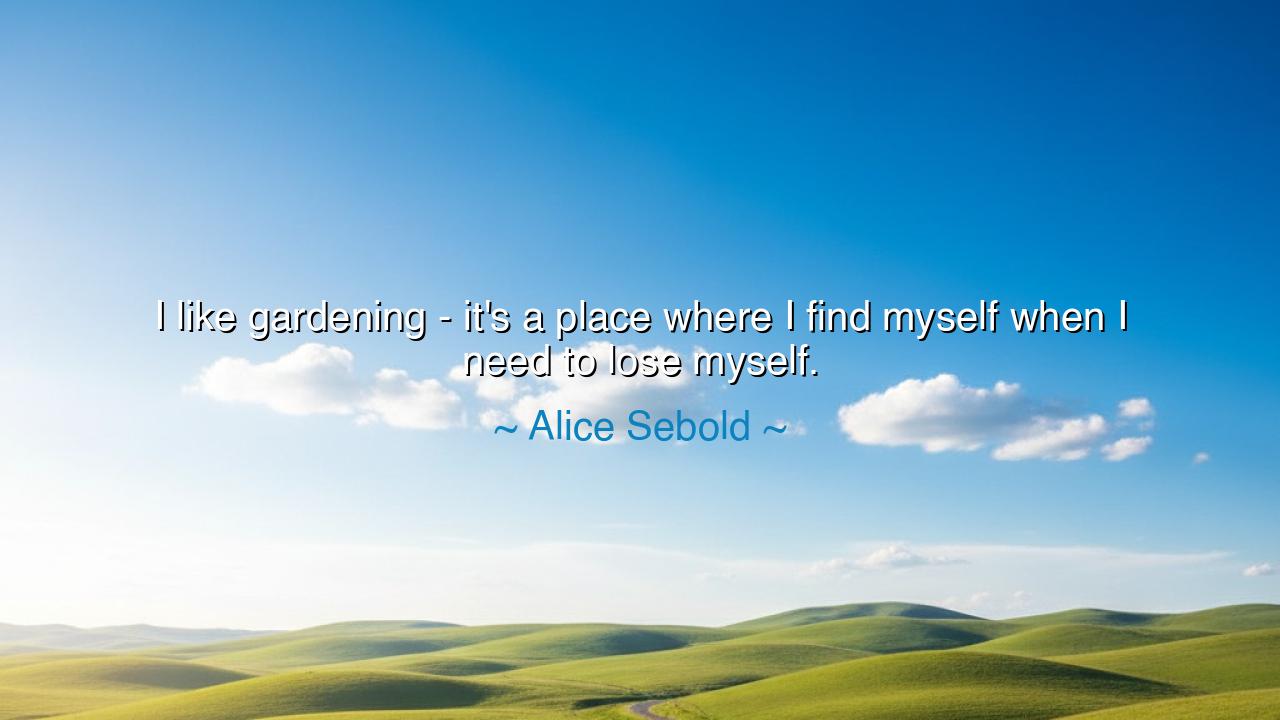
I like gardening - it's a place where I find myself when I need






O Seekers of Wisdom, gather close and listen well to the words of Alice Sebold, for in her reflection on the art of gardening, there lies a profound truth about the inner life, the soul’s journey, and the eternal quest for peace. "I like gardening - it's a place where I find myself when I need to lose myself." These words echo the ancient wisdom that life, like a garden, is a space of both discovery and transformation. In the act of tending to the earth, Sebold speaks of a return to the self—a return that is paradoxically found in the act of losing oneself in the rhythm of nature. Gardening is not just a physical task; it is a spiritual journey where the gardener surrenders their mind to the earth and, in doing so, finds deeper understanding.
In the ancient world, the relationship between humans and the earth was revered as sacred. The Greeks believed that to cultivate the land was to engage with the divine, for the earth was seen as a living spirit that nurtured all things. Plato himself believed that to understand the soul, one had to first understand the natural world, for the soul and nature were interconnected. In this sense, gardening was more than an act of physical labor—it was an act of spiritual and intellectual growth. Like Sebold, the ancients understood that in the act of cultivating the earth, they were also cultivating their own souls, gaining wisdom through the rituals of care and nurturing.
Consider the great Zen masters, who practiced their teachings in quiet gardens, finding enlightenment not in words or philosophies, but in the stillness of nature. The practice of Zen involves meditation, reflection, and the cultivation of mindfulness—all of which are mirrored in the act of gardening. In their gardens, Zen monks would often meditate as they worked, finding both peace and insight in the quiet, repetitive tasks of planting, weeding, and pruning. Gardening, for them, was not a distraction from the self, but a means of connecting to the deeper truths of life. In much the same way, Sebold finds herself in the very act of losing herself in the soil, in the quiet rhythm of planting and tending. The garden is a mirror to the soul, revealing both what we seek and what we need to let go of.
There is also an ancient story of Dionysus, the god of wine, who was closely associated with the cultivation of the vine. He was known for encouraging the celebration of life’s pleasures, but also for understanding the delicate balance of growth. The vine, like the soul, requires both care and freedom. Dionysus’s followers found moments of liberation through their connection to nature—letting go of the self in the wild, freeing their spirit while honoring the earth. Just as Dionysus let go of the restraints of order to embrace life’s chaos, so too does Sebold speak of finding her essence by losing herself in the garden. In the act of creation—whether tending to the soil or nurturing the vines—we find not only our purpose but the freedom to explore the parts of ourselves that often lie dormant.
The lesson here, O Seeker, is profound: gardening is not just a way to grow plants, but a way to grow the soul. It is a practice that allows one to surrender to the earth’s rhythms and find balance in the process of creating and nurturing life. In the act of losing oneself, Sebold shows us that we can also find ourselves—for in losing ourselves in the beauty and simplicity of the garden, we are invited to reconnect with our true nature, to remove the distractions of the world and listen to what is within. The earth, in its quiet wisdom, reveals to us the secret of renewal—just as the gardener must care for the plants, so too must we care for the mind and soul.
In practical terms, O Seeker, ask yourself: where in your life can you lose yourself to find yourself? Just as Sebold finds solace in the act of gardening, so too can you find peace in the quiet acts of care, whether it is through art, nature, or simple reflection. These moments of stillness and connection to something greater than yourself are not acts of escapism, but acts of restoration. Whether you are tending a garden, walking in nature, or reflecting quietly, recognize that these are sacred moments, spaces where your spirit can grow in its own time and in its own way.
So, O Seeker, embrace those moments of solitude and quiet work, for they are the paths to the self. Whether it is through the garden, through creative pursuits, or through the simplicity of reflection, remember that by losing yourself in these acts, you will find the deepest parts of who you are. In the garden, as in life, it is in the simplicity of nurturing and creating that we come to know ourselves, not through force or striving, but through gentle care and patience. May you always find your truest self in the moments of quiet surrender, where the world fades away, and all that remains is your connection to the earth, the universe, and your soul.






AAdministratorAdministrator
Welcome, honored guests. Please leave a comment, we will respond soon